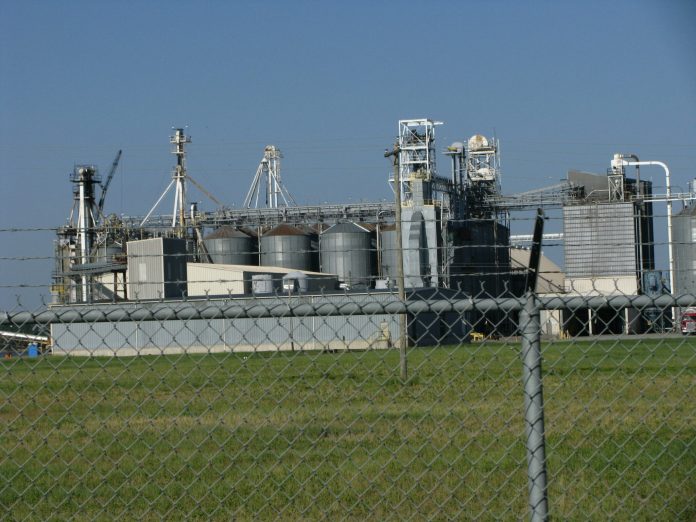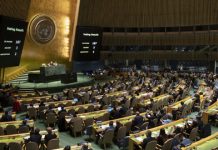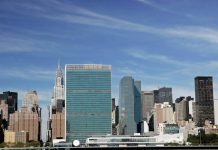Photo credit: DiasporaEngager (www.DiasporaEngager.com).
Statement delivered by IOM Director General Amy Pope at the United Nations Media Briefing in Geneva
I have just returned from Damascus, where the impact of nearly 14 years of conflict is evident everywhere. I went in as one of the first UN principals on the ground, and we met with the caretaker government, humanitarian, civil society, diplomatic and donor communities.
I saw a country at a junction—its people resolute, determined to move on from the past, determined to rebuild their lives, though wary of the immense uncertainty of what lies ahead.
The numbers tell a staggering story. Even before the latest developments, over 16 million Syrians needed humanitarian assistance, more than six million have left the country, and 7.2 million remained displaced within its borders.
The returns that it is estimated will happen are on a much larger scale than we have seen, and integrating those who return in parallel with transitional justice is going to be a truly monumental task.
In some areas of the country, essential infrastructure, from hospitals to schools, has been destroyed or is dysfunctional. Aleppo, for instance, was all but destroyed during the conflict between 2012 and 2016, with over two million people leaving the city.
Humanitarian needs range from the most basic—shelter, food, and clean water—to the complex task of rebuilding a shattered society.
And while there is a strong desire among displaced Syrians to return to their homes, doing so prematurely could overwhelm already fragile infrastructure, potentially forcing families to move again. I met with Syrians in Lebanon, and understood their uncertainty about what lies ahead.
I traveled as part of a delegation led by the ERC, which met with several representatives of the caretaker government. I met with a representative of the caretaker government working on social affairs who would be our primary government partner in our response. He has expressed interest in rebuilding the country and openness to the international community with a stated willingness to partner to address the needs of Syrians.
Historically, we were pushed out of the country by the previous government. We continued providing aid through a cross-border program, reaching millions since 2014. In Northwest Syria, where we have our larger hub presently, this is now a vital lifeline for those displaced by the escalation of conflict in Idleb and northern Aleppo. Due to increased levels of displacement in that part of Syria, this operation urgently needs more resources, and IOM has launched an appeal to address the urgent, lifesaving needs here.
IOM has also played a key role in the health sector in Syria, in cooperation with the Global Fund and WHO. IOM facilitated the establishment of medical oxygen plants in several hospitals throughout the country.
We need to address needs more widely however, and now is the time for the international community to pull together. The need to establish an inclusive society embracing religious minorities, women and diverse political groups must be at the front of our thinking when it comes to this support. Let me set out how we can most effectively help the people of Syria rebuild.
The number one priority is humanitarian assistance. The numbers are stark. More than 90 per cent of the population is living below the poverty line. We have seen 800,000 newly displaced people in recent weeks.
The reality is that up to two weeks ago, for the last 13 years of war, the UN faced incredible challenges to meet these humanitarian needs because of all the barriers put in our way by the Assad regime, preventing the UN from systematically assessing need and delivering assistance. We could not always access locations, get visas, or work effectively.
Like the people of Syria, the UN was stuck in this situation for a long time. This is an important opportunity to show that we can scale up and deliver for the Syrian people, particularly the most vulnerable, whose lives have been devastated by this long war and tyrannical regime.
The situation is fragile. The country remains under sanctions. There is a huge shortage of normal goods. Most of the economy relies on cash. The country simply needs all kinds of support from the international community.
As an illustration of the widespread poverty, when I was in Damascus, we met with civil society partners. One was a young female resident doctor, earning just $50 a month at a public hospital. She had to take on other work, just to sustain her existence.
Exemptions from sanctions for development and reconstruction efforts is critical so that we can start scaling up, but this is a matter for member states to decide.
The second key priority is stabilization. There will be a transition – justice, reparation and inclusivity is an important part of this. Housing, land and property rights are critical, and at the heart of community stabilization, in the context of anticipated returns. We have experience delivering on this in many countries, such as in neighboring Iraq, where we saw the vital role of protecting and supporting these rights in post-conflict recovery.
By safeguarding fundamental rights, rebuilding trust following years of conflict, and enabling broader programming including shelter, livelihoods, and social cohesion, we addressed immediate recovery needs while promoting a conducive environment for peaceful and durable solutions, sustainable returns, and long-term stability for those affected by conflict and displacement.
Returns will follow, however in line with our sister agency UNHCR, for the time being we are not promoting large-scale voluntary returns. Many communities are not ready to absorb the return of both internally displaced and refugees, and all returns must be voluntary, dignified and safe.
Syrians want to know that when they go home, they are going home for good, and their families will be safe and supported.
Those families have a lot to consider, they need to know that they are making the right decision. They need to know where their children will go to school. They need to know if their home is still there or has been destroyed, or if they are safe. The global landmine clearance charity The Halo estimates that large parts of the region, mainly in the northwest and southwest, are riddled with cluster munitions, missiles, landmines, grenades and other deadly explosive ordinance.
IOM is speaking with Syrians communities who say they want to assess the situation. I also spoke to Lebanese authorities at the border who explained that the regular and irregular movement at the border including people from minority groups coming into Lebanon – not because of a direct threat, but rather fear of what could happen to them, due to the current uncertainties.
Syrians in neighboring countries are very interested in ‘go-and-see visits’ and an enabling environment that would allow them to do that in a safe and secure way would be very helpful and protective to people who have been subject to hardship for many years now.
So how will we put these steps into action? Firstly, a critical role right now is capturing data. At the moment everybody from NGOs to UN partners and the diplomatic and donor community recognize the data gap that exists.
At IOM we can fill this gap, resuming an initiative allowing UN and Government partners to understand where the needs are, where to target assistance, which communities to target and the state of the nation. Undertaking this critical groundwork fast is extremely important, because without the data, we cannot know where to prioritize assistance, and so this is central to the entire response.
Without having a picture of all the pieces, we cannot put the humanitarian aid jigsaw together.
Secondly, we are scaling up our presence. Since 2018, IOM has not had presence in Damascus due to challenges with the then Syrian government. To put this work into effect, we are reestablishing our presence in Damascus and other areas, so that we have a solid footprint and resume collaborative efforts with all partners and local communities.
And thirdly, we are in close contact with neighboring countries who have hosted Syrian populations through this time. They are naturally also watchful of the situation and need support in adjusting to the changing landscape. We urge the international community to continue to provide support to those countries who host large numbers of Syrian people.
IOM has been deeply involved in several large-scale returns following peace agreements, playing a critical role in facilitating voluntary returns, reintegration, and rebuilding efforts in places like South Sudan, Rwanda, Bosnia and Herzegovina and Liberia. We know from these situations rebuilding after crisis what the challenges are, and what the urgent priorities will be.
Today, IOM reaffirms its commitment to the people of Syria.
The people of Syria have endured unimaginable hardship, yet they continue to show endless courage.
Let us match their resilience with our solidarity and honor their hope with our action. And as we mobilize, the world should not underestimate what is required.
Thank you
The recorded statement is available here
Source of original article: International Organization for Migration (www.iom.int).
The content of this article does not necessarily reflect the views or opinion of Global Diaspora News (www.GlobalDiasporaNews.com).
To submit your press release: (https://www.GlobalDiasporaNews.com/pr).
To advertise on Global Diaspora News: (www.GlobalDiasporaNews.com/ads).
Sign up to Global Diaspora News newsletter (https://www.GlobalDiasporaNews.com/newsletter/) to start receiving updates and opportunities directly in your email inbox for free.


























